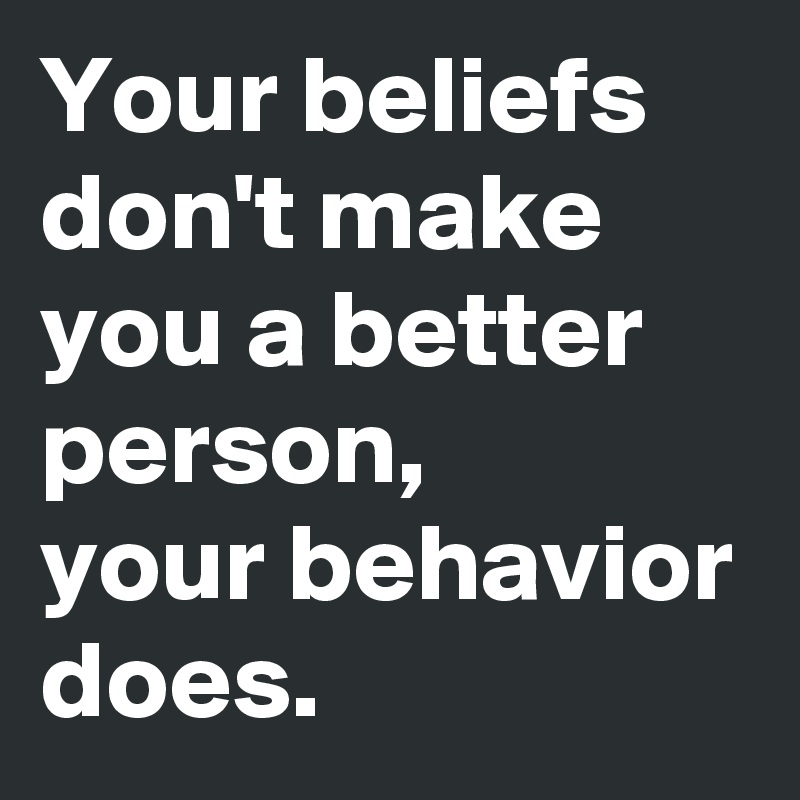In the realm of Bahá’í teachings, there exists a poignant adage that elucidates a fundamental aspect of human conduct: “Your beliefs don’t make you a better person, your behavior does.” As an assertion, this statement serves as a profound invitation to reflect upon the intrinsic values and actions that define one’s character, rather than merely adhering to a set of beliefs or doctrines. The Bahá’í Faith emphasizes that the essence of virtue lies not in professing high ideals but in the embodiment of those ideals through authentic actions.
At the onset, one must consider the concept of beliefs. In many religious and philosophical traditions, beliefs often dominate discussions regarding moral rectitude. However, within the Bahá’í framework, beliefs are not an end in themselves. Instead, they are viewed as catalysts for action. It is essential to comprehend that belief systems, while they may provide guidance and a framework for lifestyle choices, are only valuable when translated into deeds that reflect moral integrity.
The first type of content to explore is the existential dichotomy between belief and behavior. Bahá’í teachings assert that merely holding noble convictions, such as compassion and justice, is insufficient. A person may claim to cherish equality and kindness while simultaneously engaging in discriminatory practices or neglecting opportunities to assist those in need. This juxtaposition highlights the notion that belief without action is akin to a tree that bears no fruit. One’s true virtues materialize through tangible pursuits and ethical choices that promote the welfare of society.
Furthermore, the Bahá’í narrative invites individuals to engage in introspection. Self-examination becomes a foundational practice for understanding the authenticity of one’s beliefs. Are they merely superficial affirmations or are they deeply rooted in daily conduct? Through prayer, meditation, and community engagement, Bahá’ís are encouraged to cultivate an inner life that nurtures virtuous behaviors. By reflecting on the impact of one’s actions on others, believers can ascertain whether their convictions align with their conduct.
Delving deeper into the implications of this teaching, one encounters the notion of moral agency. Every action is imbued with moral significance, and individuals possess the capacity to influence their communities and the world at large through their everyday choices. This principle extends beyond personal improvement; it pertains to the collective wellbeing of humanity. The Bahá’í Faith posits that individuals are responsible for contributing positively to society. Hence, actions inspired by true beliefs can effectuate social change and foster a sense of unity among diverse populations.
The subsequent aspect to examine is the critical distinction between appearances and authenticity. In contemporary society, the veneer of belief can often sow seeds of complacency. Individuals may publicly endorse altruistic principles or participate in charitable events, yet their underlying motivations might be misaligned with genuine philanthropic intentions. This phenomenon warrants scrutiny, as it underscores the pressing need for authentic engagement in the service of humanity. To manifest moral rectitude, one must pursue actions that stem not from a desire for recognition or social approval, but from a heartfelt commitment to serve others.
Moreover, the teachings of the Bahá’í Faith accentuate the significance of accountability. In a world fraught with complexities, ethical dilemmas necessitate that individuals consistently evaluate their choices and manifestations of belief. This self-governance reinforces the idea that integrity arises from an unwavering commitment to act in accordance with one’s values, regardless of societal pressures or momentary temptations. A Bahá’í’s commitment is to uphold justice and truth, and this dedication ought to resonate in their decisions and interactions.
Furthermore, an exploration of the concept of ‘service’ within the Bahá’í framework deepens the understanding of the idea that beliefs must be paired with actions. Service is seen not merely as an obligation but as a transformative process that enriches both the giver and the receiver. Engaging in acts of service cultivates a sense of connectedness and mutual support among individuals. This ethos reflects the notion that true fulfillment and goodness emerge through active participation in the broader human experience, thereby transcending individual belief systems.
In juxtaposition to service, one must consider the transformative power of community. The Bahá’í Faith asserts that communal living and collaboration are indispensable for the advancement of civilization. Here, the intertwining of beliefs and actions is vividly apparent, as collective efforts toward a common goal reflect the congregation’s values. In community projects, the practical application of beliefs becomes tangible, and individuals witness the collective fruits of their labor as they endeavor to make positive changes in the world.
Lastly, the Bahá’í teachings serve as a reminder that personal evolution is an ongoing journey. The pursuit of becoming a better person through actions is an iterative process. As one constantly engages with their beliefs, evaluates their implications, and modifies their behaviors, they incite personal growth and spiritual advancement. This journey instills humility, as individuals come to recognize that they are perpetually learning and evolving, driven by the earnest desire to align their actions with their noble principles.
In conclusion, the assertion that “Your beliefs don’t make you a better person, your behavior does” resonates profoundly within the Bahá’í context. It challenges individuals to transcend mere verbal affirmations and engage in authentic actions that epitomize the core tenets of their faith. As one embraces this philosophy, the potential for personal and communal transformation unfolds, fostering a convocation of compassion, service, and accountability. In the quest for moral and ethical living, it is the congruence between beliefs and actions that ultimately cultivates a better world.
